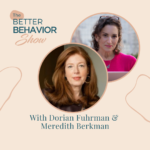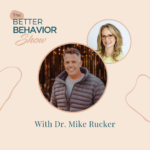My guest this week is Alex Stuart, and we discuss how to live a low toxin life. We are surrounded by more toxins than ever before, and they impact our physical and mental health, as well as the health of the environment. Children are especially sensitive to toxin exposure and many parents are unaware that these exposures can be one of the root contributors to common learning, attention, mood, anxiety and behavior issues for children. The topic of reducing toxin exposure and adopting a more eco friendly lifestyle can feel overwhelming and even scary, but Alex, the author of “Low Tox Life,” is the perfect guest to help us understand the key pieces we need to know about and the simple and practical changes we can start making to improve the lives of our children, selves, and environment.
Why is Vaping Bad for Teens & Kids–Addiction Facts & How to Help
My guests this week are Dorian Fuhrman and Meredith Berkman and we discuss vaping and e-cigarettes. Kids and teens vaping is something many have asked me to address as it’s becoming a more widespread problem among younger and younger kids. We now know that vaping carries a significant number of health risks, and leads kids on a path toward addictive behavior and substance use that can be difficult to break. I’ve invited the co-founders of Parents Against Vaping e-cigarettes (PAVe), Dorian and Meredith, on the show to help us better understand the issue, the risks involved, how they are working to end the sale of all flavored tobacco products, and most importantly, how to talk with your kids about it.
Helping Kids & Teens Develop a Healthy Body Image
My guest this week is Dr. Charlotte Markey and we are talking about body image and self-worth for our kids, especially those in the tween and teen years. With the impact of social media and post pandemic this is a topic that needs to be on parents’ radars. Dr. Charlotte and I will talk through current research on how younger brains are extremely impressionable, perceptions of adolescents, helpful approaches to developing a healthy body image (for both boys and girls as they are often different), and how to support those that are struggling, including when professional help may be worth seeking.
How to Have Healthy Boundaries in Every Area of Your Life
My guest this week is Melissa Urban and we discuss one of my favorite topics and also one of the most asked about: boundaries. Having healthy boundaries are key, not only in the context of raising kids, but for a healthy life in general. Many of us know this, but struggle with the implementation and the discomfort, even though we know having them keeps us safe and sane. We talk about how to set boundaries with various people in your life, what to do when your child, in-laws, family, or another adult pushes your boundaries, how to juggle work-life boundaries, how to deal with your own feelings around setting and enforcing boundaries, and so much more.
Stop Bullying: How Parents and Professionals Can Support Kids
My guest this week is Rebecca Burd and we are discussing how to stop bullying. Kids of all ages are affected by bullying and children who are neurodivergent, have other unique needs, or differences are often prime targets for this damaging behavior. To unpack this issue, Rebecca and I first discuss the prevalence of the bullying epidemic and why disciplinary structures don’t solve bullying, then, most importantly, provide many tangible, impactful solutions that parents and professionals can implement to create a real culture shift, especially in the schools, to support our youth.
It Affects Everyone: How to Talk about Mental Health & Suicide
My guest this week is Erin Matlock and in this episode we discuss an extremely important and sensitive topic around mental health and suicide. I know it can be an anxiety-provoking subject, so it is my intention to not only alleviate some of the stigma and misconceptions, but also to share the teachings and immense hope that are interwoven throughout Erin’s story. I invite you to listen with open minds and hearts to take away helpful messages, tools, and resources so we can better support kids, teens, and adults who are struggling.
Beyond Diet & Prescriptions to Solve Skin Conditions in Kids
My guest this week is Jen Fugo and we discuss skin conditions and how to get to the underlying cause, especially when diet and prescriptions are not working, or working enough, to clear skin issues such as chronic acne, eczema, psoriasis, etc. Depending on the severity, skin conditions can have massive physical and mental health tolls on kids and parents. Jen is an expert in going beyond the conventional model to help clients overcome extremely difficult and often debilitating skin conditions. She shares many research-based integrative alternatives to consider, questions to ask to dig deeper, and resources so kids (and adults) can clear skin issues and thrive, not only physically, but mentally and socially as well.
Dr. Nicole’s Background, How to Build Trust & Manage Overwhelm
I thought that it would be fun to flip things around a little bit today, so this is going to be an interview of Dr. Nicole, because so many of you write in with lots of questions about me, my life, the work that I do, and of course a lot of behavior related questions! So I’ve invited Sara Treffert, a fellow practitioner, but more importantly, she’s on the team that produces this podcast, to interview me about the things that you asked most about! It’s a peek into my background and clinic, and then we get into some top parenting questions around building trust and managing overwhelm. And if you like this AMA (ask me anything) format, please let us know and we can do more of these in the future!
How to Improve, Repair & Rekindle a Relationship When Parenting
My guest this week is Eli Weinstein and we discuss how to navigate, improve, and rekindle a relationship, especially when children enter the mix. How can you manage raising kids while keeping your partner relationship healthy and avoiding the all-too-common scoreboard mentality? We talk about that and how to avoid and correct other relationship pitfalls, particularly while parenting, and especially when we have one or more children who have extra needs. It’s challenging to balance all of this, and both men and women can feel misunderstood along the way, but fostering a healthy relationship with our partner actually helps us to be better parents. Partnered parent, or not, this is yet another episode that is jam packed with nuggets of wisdom, mindset strategies, and resources to support healthy relationships in all areas of your life.
How Busy Parents Can Get Healthy & Stay Healthy
In this episode, Dr. Anthony Balduzzi and I discuss practical and tangible tips to make health stick. It’s tough raising children, and our health as parents typically gets shoved to the way-side. But reality is, it’s not serving us or our children. When we feel good, we show up as better parents and humans. Dr. Anthony shares many of his strategies to make nutrition simple and sustainable, movement more enjoyable and doable, and how to build and maintain a realistic mindset even when you are in the eye of the storm of the chaos of being a busy parent with an aging body and aging metabolism.
Stress Reduction & Mental Health Innovation for Children & Adults
My guest this week is Dr. David Rabin, and we discuss innovative ways to support stress reduction and mental health for children and adults. Chronic high levels of stress is an issue for so many children and teens, especially those diagnosed with any type of neurodevelopmental or mental health condition. Dr. Rabin shares novel research and approach to one of the lesser known ways we can reduce and manage stress. What is that? Touch! We talk about new innovations to mimic the same positive neurological response, as well as providing ways that support symptom reduction in the moment and build regulation capabilities over the longer term.
How to Have Fun Even When Life and Parenting Get Tough
Does the word “fun” make you smile and reminisce of what brings you joy, or does it make you think “huh, what’s fun?” In this episode, Dr. Mike Rucker and I discuss how to have fun, even when life gets tough, and how doing fun things, even tiny ones, can make you a better human and parent, as well as having a more regulated mood. Mike shares his realistic approaches to evaluating your life activities using a simple, non judgmental tool called the PLAY model and how you can co-create fun with your kids and in your adult life.
- « Previous Page
- 1
- 2
- 3
- 4
- …
- 21
- Next Page »













